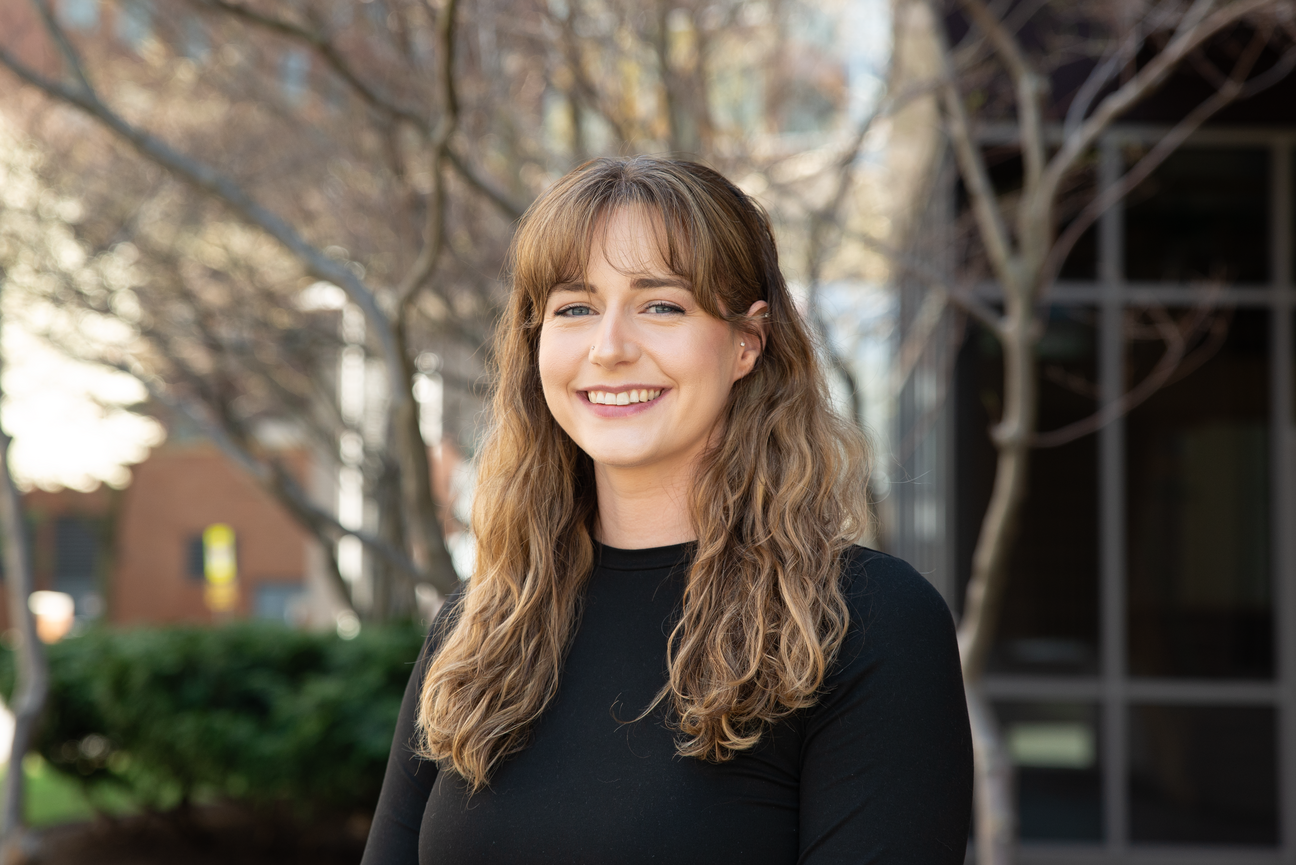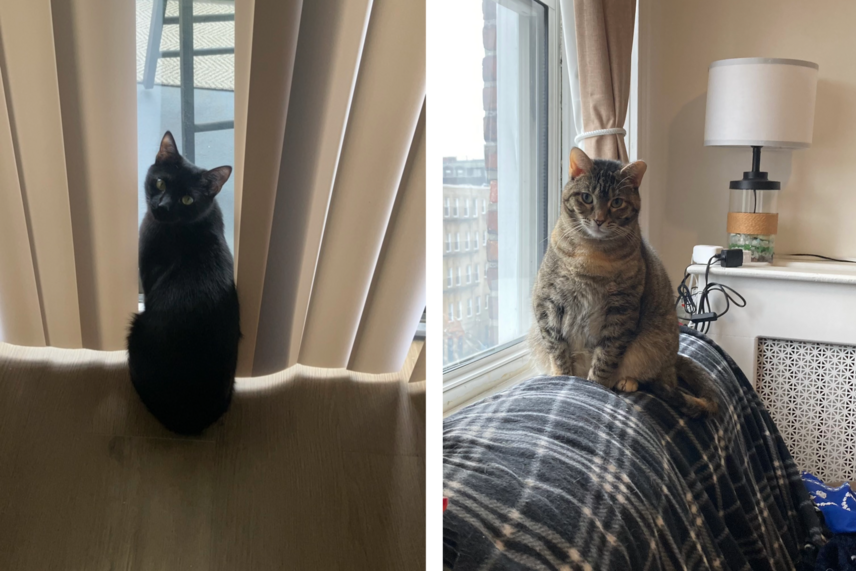
Alisa White
Madeleine Turner/Whitehead Institute
Meet a Whitehead Postdoc: Alisa White
Alisa White is a postdoc in Whitehead Institute Member David Page’s lab studying sex differences in the brain. We sat down with Alisa to learn more about her and her experiences in and out of the lab.
What is the focus of your current research?
In the Page lab, we're really interested in the chromosomal basis of sex differences in human health and disease. I was trained as a developmental neurobiologist, so in my research I'm merging the two interests by studying sex differences in the brain. How do the sex chromosomes contribute to sex differences? How do hormones contribute to them? In particular, right now, I'm looking at sex differences in the onset of puberty, or pubertal timing. Puberty is something we all go through and is fundamental for species propagation, yet we don’t talk about it much and we still don’t know everything about it.
In the general population, females go through puberty on average about a year earlier than males. If we look at disorders of pubertal timing, the difference gets really extreme, where females are 20:1 more prone to go through precocious or early puberty, whereas males are anywhere from 2:1 to 5:1 more prone to go through delayed puberty. I am looking at two of the main neuronal populations that are known to regulate pubertal timing, and trying to disentangle if there's some difference in their activation levels or gene expression between males and females that could drive these differences in pubertal timing.
When you were a little kid, what did you want to be when you grew up?
There were two things that I was super interested in becoming when I grew up. One: when I was in kindergarten, I wanted to be a stay-at-home mom. I love my mom and I looked up to her, and I wanted to be like her. Two: I was always fascinated by science and I loved the outdoors; so the other job that I was really interested in was marine biology. I absolutely love the ocean and exploring tide pools. That's what I remember most fondly from vacation, going to Maine and spending the entire afternoon looking through tide pools, and finding as many living organisms as I could. Those were my two goals. I think I got kind of close to marine biology with my career—at least the biology part—and then maybe one day I'll get to be a mom. Who knows?
When and how did you decide on a career in science?
I always knew I wanted to do something with science. When I went to undergrad, I purposely sought out a physiology and neurobiology degree and went in full force. I declared that as my major immediately. However, choosing basic science didn’t happen for me until maybe my junior year. I took this one class called something like “The Molecular Principles of Physiology,” only because it was required for my major. When I showed up to the first class, the professor wrote on the board, “Failure is not an option,” and proceeded to ask us, “What does this mean to you?” I thought that was an interesting question, so he had already got me thinking. He approached class in a different way than any other professor had.
Then he brought out this beaker full of little folded pieces of paper and he said, “Whatever you pull out of this beaker, you are going to get to know this as well as you can, inside out. You're going to be the expert on this by the end of the semester.” Each paper had a name of a gene on it, and I pulled Spc24. That was just a random combination of letters and numbers to me at the time, but to this day it’s probably my favorite gene. From there, we essentially learned how to study a gene through every method available to us. What I learned in that class is that doing research is not about following a textbook that tells you every step, where there’s an expected answer; you can actually ask your own questions. It was so fascinating to me, and I thought: wait, you could do this for a career? That's amazing. It's funny, because a lot of people that I met in the class absolutely hated the process and for them it solidified going pre-med. For me, I thought if I can just ask my own questions for the rest of my life and explore unknowns, that would be a really cool job. I ended up joining that professor's lab for my PhD research.
Where do you see yourself in ten years?
I would absolutely love to be leading my own research group. I love being somewhere cutting edge and collaborative like Whitehead Institute. I also definitely want to train younger students, including undergraduates. I've had such great experiences with my mentors, and I find myself most fulfilled when I have people under my tutelage, and we’re able to share our joy for science with each other. I’m still trying to figure out whether I should be at a smaller college where I can have more impact on young students, or somewhere larger with more resources for research.
What are your hobbies?
Most of my hobbies are about trying to be active, because I feel like often in the lab, we are sedentary. I am a member and new co-leader of the Whitehead Running Club. I actually don’t love running, but I like the people, and the food that we get. The coffee at the end of the run keeps me motivated. It’s been a great way to meet people from other labs, while also being active and getting my breakfast and coffee on a Friday. I also joined the MIT recreational crew team, which by the way is available for anyone even somewhat affiliated with MIT. I used to row crew in high school, and then I had stopped for a decade, but I picked it up again about a year and a half ago and that's super fun. I’m always trying to recruit more people to join the rowing team, but it is a hard sell waking up and getting to the boathouse at 5:45 AM. I will say it is absolutely gorgeous to see the sunrise on the Charles.

Alisa's cats, Shadow (left) and Casadee (right)
Courtesy of Alisa White
What advice would you give to someone who doesn’t currently enjoy running, but wants to start?
What I did was start with someone else who was at the same experience level running as myself. Also, the more experienced run club members have been serving as my unofficial coaches throughout my running journey. We made a rule that if we were on a bridge, we're allowed to walk. The loop we usually do covers two big bridges and a couple small foot bridges. We agreed that if somebody wants to walk, we can all do it. I think that's a good way. I would say don’t push yourself too much. Set goals and track your progress. If anybody at Whitehead reads this and wants to join Running Club, you can do the walking on bridges rule. I'll do it with you.
Do you have any pets?
I have two cats. My cat Shadow I got when she was a kitten while I was in grad school. She's such a sweetie, super friendly, amazing. My other cat, Casadee, we adopted more recently hoping that she would be a nice friend for Shadow because my partner and I noticed when we moved to Boston that Shadow would meow when we left her alone. We looked around at shelters and found her, and when we were checking out of the shelter the staff asked which cat we settled on. We said Casadee, and they started whispering to each other almost in shock, “They chose Casadee!” Right away we realized we might have made a mistake.
She took a long time to adjust to living with us and caused a lot of trouble. I will say that Casadee and Shadow are great friends, and Casadee is a lovely cat. However, most of my friends and my family have never met her. They’ve never even seen her. We’ve had her for two years and she won’t accept human touch. She's this scaredy cat who I want to love me so badly, but I think she just doesn't like people. My partner and I could go on for hours talking about the crazy things Casadee has done to avoid our love. We're learning to coexist. But one day, I'm going to pet her – on her terms.
What would be your advice to someone, say an undergraduate student, who is considering whether to pursue research?
Keep your options open and your expectations realistic. You might complete a large amount of work in a few short years, but you also might take your time and struggle a little bit. You will experience failures, but they will also be learning moments. Don’t get married to any one idea. You could accidentally get an interesting result that might end up being a launching point for your career. Be patient, be realistic, and try to find an environment that is collaborative and accepts you for who you are. I think if you find a mentor who you can be honest with about what you like and don’t like doing, and they can be honest with you too, then you can build a career that really suits you.
Topics
Contact
Communications and Public Affairs
Phone: 617-452-4630
Email: newsroom@wi.mit.edu


